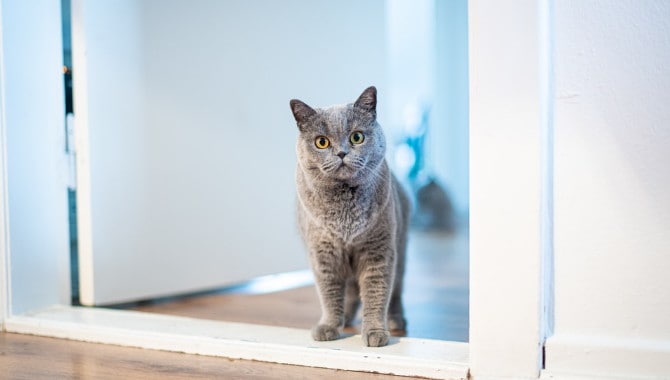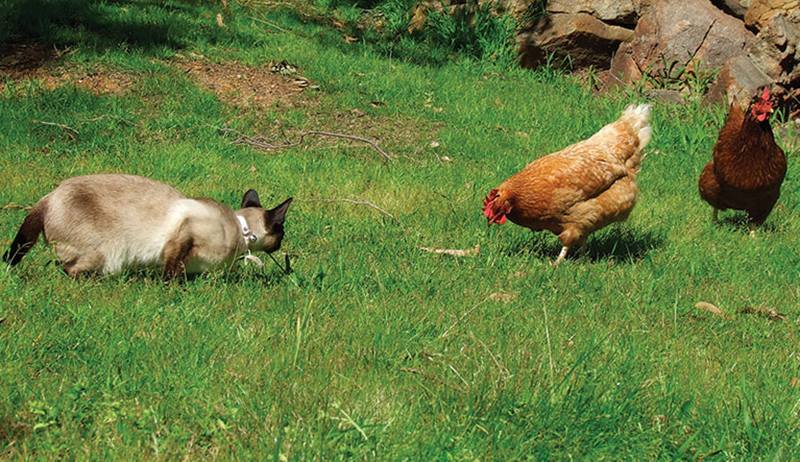Owning a cat can really change the way you see and experience the world around you. There are studies that suggest that being a cat person may make you more socially sensitive and even experience less negativity.
While there’s no doubt that being a cat-parent is awesome, there are also times when our feline friends can turn fickle (not intentionally, of course!)
The Door Dasher
As your cat learns more about its surroundings, it can occasionally develop some annoying habits. And one of the peskiest practices your cat can learn is the ability to open the door on its own.
Once this habit starts, you’ll soon find yourself wondering how to make it stop. The good news is that there are some practical ways to get it under control.
However, before we get into the actual actions you can take, let’s look at a few reasons why it happens.
Being aware of these behavioral tendencies will allow you to deal with your kitty in the best possible way.
5 Common Reasons why Cats try to ‘Escape.’

There are several reasons why your cat can behave this way. Here are some of the main causes.
- Some cats are simply more adventurous. They like exploring the house. A closed-door becomes an easy target, regardless of whether it’s a bathroom door, a closet door, etc.
- Cats can start opening doors if they’re upset about being shut out of a particular room. For instance, your cat may try opening your bedroom door seeking your company. If it’s accompanied by constant meowing, the solution may be as simple as leaving the door open.
- Indoor cats may also like ‘patrolling’ their surroundings. If it’s inside your house, you can use solutions like the ‘Door Buddy’ to avoid locking the doors all the time.
- Cats also have the urge to hunt for prey. If they keep returning on time, you can use a cat flap or cat door. If you already have a dog at home, you may already have a dog door anyway. If you have an additional screen door, you can order a custom cat gate or get one installed by your contractor. Pet doors work great for pet owners who don’t want to constantly hold the door open every time your pet needs to go out.
- Our feline friends also like ‘marking’ their territory with urine. This can often take them outdoors into the neighbourhood. A well-placed litter box or scratching post can prevent them from pawing away at the door handle.
Can I stop my cat from going out altogether?
Most of the time, the cat’s instinct to explore will override the rules you want it to follow. Even the most passive indoor cat has the urge to go out once in a while.
Whether it’s to explore, mark their territory, find a mate, or simply to ‘getaway,’ it’s in their genes. So, you can’t really prevent some outings.
But as a cat parent, these escapades can worry you a lot. They run the risk of encountering feral cats, stray cats, or getting lost.
What you can do is make small changes in their environment that discourage this behavior.
6 Useful Tips to Prevent your Cat from Opening Doors
- Change your door handles.
If you have a lever door, don’t be surprised if your cat figures out how to open it. A polydactyl cat can be especially adept at opening door levers, thanks to the extra toes. A good solution is to replace it with a doorknob. It’s harder for their paw to grip or get leverage on rounded knobs.
- Discourage your cat from going near the ‘escape route.’
Try to make the doorways as unappealing as possible for your cat. As a pet owner, you’ll already be familiar with the kind of sounds or gestures that gets your cat’s attention. So, every time your cat approaches that sliding door or even the door frame, try to shoo it away.
You can draw its attention by clapping your hands or making a ‘Shush!’ sound. You can also use products like Sticky Paws to make the doorway an inconvenient place to walk. Most cats don’t like citric smells. So, spraying some citrus liquids can make it unpleasant for them. It works especially well if you have a whole kitten litter in the house.
- Prepare some alternatives
If you’re not letting your kitty out, you can at least offer some substitute activities. For example, a cat tree can offer your pet more territory and a sense of safety. You can also use a variety of cat toys to keep them occupied. Scratching posts can also keep them occupied and offer more territory. If they respond well to these alternatives, you can reward them with their favourite cat food.
- Setup detection mechanisms
An easy way to do this is to attach a loud bell to your door. Sudden noises can displease cats and discourage them from repeating the action. Motion-sensing alarms can also do the job. Anything that makes a loud noise will prevent them from going near the area.
- Pet’s Microchip
If you’re willing to invest some money into your cat’s safety, there are technological options too. Many cat owners today use a pet’s microchip. This chip gets injected into your kitten without harming them. So, it’s much more permanent than, say, a pet’s collar. However, make sure you consult a pet expert or your vet before going for this option.
The chip allows easy identification of your cat based on the information in a database. Vets and animal shelters can easily access this data and match it to your kitty with a scanning device. So, if your feral ever gets lost, there’s a much higher possibility of finding it again.
- Electronic Pet Door
Today, many pet lovers are using electronic pet doors for better safety. If you opted for the pet’s microchip, you could also install an electronic pet gate that only opens for your pet. So, there’s no risk of stray cats or dogs making their way to your home. Smart Keys can also be fitted into your pet’s collar, giving them exclusive access to the pet gate.





Good post. I am facing a few of these issues as well.. Amber Snow
Very good post. I am going through many of these issues as well…